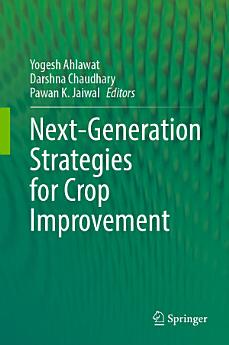Next-Generation Strategies for Crop Improvement
About this ebook
In an era of climate change, increasing population, and environmental degradation, the need for revolutionary advancements in agriculture has never been more urgent. This book delves into the transformative potential of emerging methodologies, from precision breeding and genetic engineering to computational biology and synthetic biology. Through compelling case studies and insightful analyses, readers discover how novel approaches are revolutionizing crop breeding, cultivation, and resilience. The central theme of the book is the promotion of sustainable agricultural practices and the development of resilient crop varieties capable of withstanding environmental stressors, pests, and diseases. The book fosters interdisciplinary collaboration crucial for tackling complex agricultural challenges by combining insights from diverse disciplines, including bioinformatics, computational biology, and ecological sciences. From disease-resistant crops to stress-tolerant varieties, the advanced strategies of crop improvement offer avenues for sustainable agriculture and global food security.
This book is essential reading for students, academics, researchers, scientists, and policymakers interested in and working in the fields of agriculture or biotechnology.
About the author
Dr. Yogesh Ahlawat is a plant molecular biologist with over 13 years of experience in functional genomics, biofuel research, and crop trait improvement. He earned his Ph.D. from Michigan Technological University, focusing on enhancing biofuel production by modifying plant cell wall biosynthesis. At the University of Florida, his postdoctoral work centered on extending postharvest shelf life in horticultural crops. His research involves genetic manipulation of lignin biosynthesis using advanced molecular tools. Dr. Ahlawat has published extensively, holds patents, and received various national and international awards, contributing significantly to sustainable agriculture and bioenergy innovation through cutting-edge molecular approaches.
Dr. Darshna Chaudhary is an Associate Professor at the Centre for Biotechnology, Maharshi Dayanand University, Rohtak (India). She is post-graduate and doctorate in Biotechnology from M.D. University, Rohtak (India). Her key areas of interest include edible vaccine development in plants, oil quality improvement in Brassica juncea using CRISPR-Cas9, RNAi-based pest management, and genetic transformation of Vigna species for crop improvement. She has guided over 70 M.Sc. dissertation students and eight Ph.D. students. She has published more than 50 research papers in nationally and internationally reputed peer-reviewed journals. Dr. Chaudhary has awarded seven national research projects funded by agencies such as UGC, DBT, DST-SERB, and HSCSIT and out of which, five she has successfully completed. She has edited a book published by Springer Nature. She is a life member of several scientific societies. She has been awarded DST Young Scientist and university incentives for research achievements. In addition to her research and teaching roles, she actively contributes to academic administration, curriculum development, and institutional biosafety at M.D. University.
Dr Pawan K. Jaiwal is a Professor Emeritus at the Centre for Biotechnology, M.D. University, Rohtak (India). He has worked as the Dean of the Faculty of Life Sciences and the Director of the Centre for Biotechnology, M.D. University, Rohtak-124001. He graduated in Botany (Honours) from the University of Delhi, Delhi, post-graduation and doctorate in Botany from the Kurukshetra University, Kurukshetra (India). He has been meritorious throughout his studies. He served the M.D. University in various positions as an Assistant Professor (1986-1998), Associate Professor (1998-2006), Professor (July 2006- December 2017), Director, and Dean, and he has participated in multiple committees and statutory bodies of the University from time to time as chairman or member. He has nearly 35 years of post-graduate teaching experience in molecular biology, genetic engineering and plant biotechnology. Dr Jaiwal has contributed 16 books published. He has also published 28 book chapters and 112 research papers in nationally and internationally reputed and referred research journals. He is a member of several academic bodies and is on the editorial board of National and International journals. He has guided 27 students to their Ph.D. He has completed 12 major research projects funded by various national and international agencies, such as UGC, CSIR, DBT, DST, HCST, and JSPS, Japan. He has been awarded the DST Young Scientist, INSA visiting Fellow, DBT overseas Associate, Prof H.S. Srivastava Gold medal and BSR Faculty Fellow. He has worked and trained at the Institute of Plant Sciences, ETH, Zurich (Switzerland), the National Research Centre on Plant Biotechnology, New Delhi and the University of Ghent, Belgium. He visited NIAS, Tsukuba, Japan; the Chinese Academy of Agriculture Sciences, Beijing, China; and the University of Massachusetts, Amherst, USA, for collaborative research. He has significantly contributed to the genetic improvement of legumes, oil crops and cereals.





